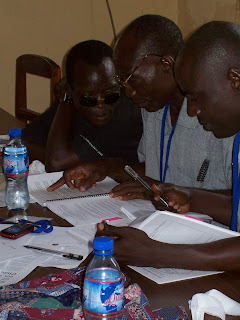
Day 7 of the Peace Education Workshop was spent utilizing the skills the participants learned the previous days. The participants presented their lessons using hands on activities and games. Each teacher had
a small group of "students" and were observed and given feedback on their lesson. The teachers and the students had a fun time getting into their roles and providing an opportunity for practice. This time was valuable to the participants' future use of the skills learned during the workshop.

Since Liberia's Independence day was soon approaching, the workshop was cut short a day earlier than planned. The rest of day 7 was spent bringing the workshop to a close and having an official closing ceremony. Participants, members of the Liberian Annual Conference, and local news reporters were invited to a celebration of learning and a call for equality. Jefferson B. Knight, the director of the Human Rights Monitor spoke, calling on government officials, as well as the United Methodist University to provide equal rights and equal opportunities to all people with disabilities throughout the country, especially equal educational rights. The participants also were given a small bag of classroom supplies, certificate of completion, and lunch.
Through it all, not only did the teachers and staff at Hope for the Deaf have an opportunity to learn and practice new skills, attention was given to a minority group of people striving to gain the support from their community and country, and two organizations came together to learn from each other and promote the rights of persons with disabilities.








 On the third day of the workshop, we discussed in depth the causes of conflict. The participants were able to make the connection between unmet basic needs and conflict, as well as how one handles conflict, which can either be in a positive way or a negative way. Though conflict (a disagreement) may be inevitable in life, it is the way one deals with conflict that will produce a positive or negative consequence. The participants also learned about various conflict resolution techniques through role plays and discussion.
On the third day of the workshop, we discussed in depth the causes of conflict. The participants were able to make the connection between unmet basic needs and conflict, as well as how one handles conflict, which can either be in a positive way or a negative way. Though conflict (a disagreement) may be inevitable in life, it is the way one deals with conflict that will produce a positive or negative consequence. The participants also learned about various conflict resolution techniques through role plays and discussion.
